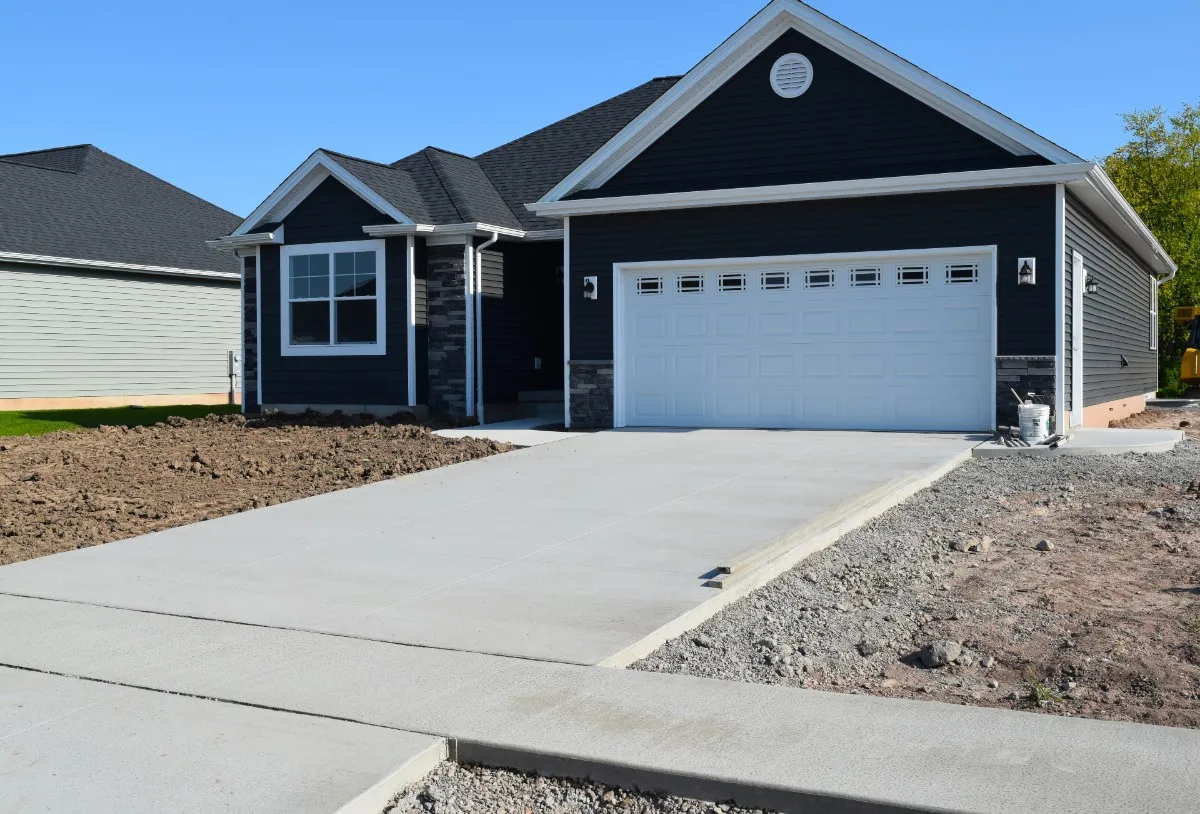Available Now
How Thick Does the Concrete Need to Be for a Driveway

For a driveway, concrete thickness typically should be at least 4 inches. Thicker concrete (5-6 inches) is better for heavy traffic or harsh climates, while local codes may also influence thickness.
· Concrete Thickness Matters: The thickness of your driveway's concrete is fundamental to its durability and longevity.
· Consider Your Climate: Extreme weather conditions necessitate thicker concrete to withstand the stresses of freezing, thawing, and temperature fluctuations.
· Traffic and Vehicle Type: The type of vehicles using the driveway, whether passenger cars or heavy-duty trucks, determines the required thickness.
· Local Regulations Apply: Always check your local building codes and regulations, as they can dictate specific concrete thickness requirements.
· Consult with Experts: Engaging with structural engineers and professionals can help you make informed decisions about the right concrete thickness for your unique circumstances.
When it comes to the world of construction and home improvement, the thickness of your driveway's concrete might not be the first thing that comes to mind. However, as someone who has learned the importance of this often overlooked detail through personal experience, I can't stress enough how crucial it is to get it right. In this comprehensive guide, we will dive deep into the topic of driveway concrete thickness, exploring why it matters, the factors that influence it, recommended standards, regional variations, and much more. By the end, you'll be equipped with the knowledge to make an informed decision about the thickness of your driveway concrete. Notably, for beginners, you might want to check this basic guide on concrete driveways to grasp the foundationalknowledge.
Introduction
When planning a driveway project, it's easy to get caught up in the design and aesthetics. However, one fundamental aspect that should never be overlooked is the thickness of the concrete. The thickness of your driveway's concrete is the foundation upon which its durability and longevity depend. If you're thinking of DIY-ing this project, here's a handy guide on how to make a concrete driveway.
Importance of Proper Concrete Thickness

Why is the thickness of your driveway's concrete so crucial? Let me break it down:
· Strength and Durability: The concrete thickness determines the structural integrity of your driveway. Insufficient thickness can lead to cracking and premature wear. Before making a decision, it might be useful to understand how to order the rightamount of concrete for your driveway.
· Weight-Bearing Capacity: Different vehicles have varying weights, and the concrete must be thick enough to support them without sinking or cracking. Moreover, the proper slope or pitch of the driveway, which is as vital as its thickness, ensures proper water drainage. To ensure proper drainage and avoid water pooling, it's crucial to understand how to adequately slope aconcrete driveway.
· Climate Resistance: Thicker concrete can better withstand the stresses of extreme weather, including freezing and thawing.
· Long-Term Cost Savings: Investing in the right thickness upfront can save you money on future repairs and maintenance.
· Concrete Cure: The thickness of concrete also affects its curing process. Thicker concrete takes longer to cure fully, which can impact the overall durability and strength of the driveway.
· Water Drainage: The slope or pitch of the driveway is as important as its thickness. A well-designed slope ensures proper water drainage, preventing puddles and water damage. This means that even a thicker driveway can face issues without the right slope.
Factors Affecting Concrete Thickness
Several factors influence the choice of concrete thickness. Among these factors, local building codes stand out. Concrete thickness requirements can vary significantly by location due to local building codes and regulations. Always check with your local authorities, or visit the main Concrete Cairns website for a more comprehensive overview.
· Climate: Extreme temperature fluctuations can impact durability. Thicker concrete is advisable in areas with harsh winters or sweltering summers.
· Traffic: Consider the vehicles using your driveway. For standard passenger cars, a certain thickness might suffice, but heavier vehicles require thicker concrete.
· Soil Conditions: The stability of your soil can affect the required thickness. Unstable or shifting soil may necessitate thicker concrete.
· Budget: Thicker concrete comes at a higher cost, so balancing your budget is crucial.
· Local Building Codes: Concrete thickness requirements can vary significantly by location due to local building codes and regulations. Always check with your local authorities to ensure your driveway complies with these codes.
· Weight Distribution: The thickness of a driveway should consider the weight distribution of vehicles that will use it. For example, an RV or heavy-duty truck will require a thicker concrete layer than a standard passenger car.
· Inspection Holes: During construction, contractors may drill small inspection holes in the concrete to check its thickness and quality. These holes are later filled and sealed, ensuring the driveway meets the desired thickness.
Recommended Thickness Standards
| Vehicle Type | Recommended Concrete Thickness (Australia - mm) |
|---|---|
| Passenger Cars | 100 mm |
| SUVs and Light Trucks | 100 - 125 mm |
| RVs and Heavy Trucks | 150 mm or more |
Residential driveways typically have a minimum thickness requirement of 4 inches. However, for high-traffic areas or regions with extreme weather, experts often recommend 5 to 6 inches of concrete. If you want to go the extra mile for added strength, you can even opt for 8 inches.
Regional and Local Variations
Concrete thickness requirements can vary by region or locality. For instance, Brisbane City Council in Australia may have specific requirements that differ from other areas. Always check local regulations to ensure compliance.
| Location | Minimum Concrete Thickness Requirement (Australia - mm) |
|---|---|
| Brisbane City, QLD | 125 mm |
| Sydney, NSW | 100 mm |
| Melbourne, VIC | 150 mm or more |
Concrete Thickness for Different Types of Vehicles
The type of vehicle using your driveway plays a significant role in determining concrete thickness. For standard passenger cars, 4 to 5 inches might suffice. However, if you plan to accommodate heavier vehicles like RVs, campers, or boats, you'll need thicker concrete to handle the added weight. When planning for such vehicles, it's essential to consult experts or refer to specific guidelines on driveway thickness standards.
Concrete Thickness for Durability

The durability of your driveway depends on its concrete thickness. Thicker concrete is less prone to cracking, spalling, and other forms of damage, ensuring your driveway stands the test of time.
Preparing the Base
The base preparation is just as important as the concrete thickness. A properly prepared base ensures even weight distribution and minimizes settling, affecting the required thickness. Ensure the base is compacted, well-drained, and free from debris.
Impact on Cost
It's essential to consider how concrete thickness affects the overall cost of driveway installation. Thicker concrete requires more materials and labor, leading to higher initial costs. However, the long-term savings in maintenance and repairs can outweigh the initial investment.
Engineering Considerations
Engineers often play a crucial role in determining the appropriate concrete thickness for your driveway. They assess factors like soil quality, expected traffic, and local climate to provide expert recommendations.
Special Cases and Considerations
There are instances where thicker or thinner concrete may be required. For example, if your driveway has a significant slope, additional thickness can provide stability. Conversely, in areas with excellent soil quality and minimal traffic, thinner concrete may suffice.
Measuring Concrete Thickness
Professionals measure concrete thickness using specialized tools like ground-penetrating radar or ultrasound devices. These methods provide accurate readings of the concrete's thickness, ensuring compliance with standards.
Concrete Thickness in Australian Standards

In Australia, concrete slab thickness is governed by standards outlined in AS 2870-2011. These standards provide guidelines for the design and construction of residential slabs and footings, including driveway concrete thickness.
Tips for Choosing the Right Thickness
Here are some practical tips for homeowners to determine the right concrete thickness for their driveways:
· Consult with a structural engineer for expert advice.
· Consider local regulations and climate conditions.
· Evaluate your budget and long-term maintenance costs.
· Account for the types of vehicles using the driveway.
· Ensure proper base preparation.
Conclusion
In conclusion, the thickness of your driveway's concrete is a critical factor that can significantly impact its longevity and durability. By understanding the importance of proper concrete thickness and considering the various factors that influence it, you can make an informed decision that ensures your driveway remains in excellent condition for years to come.
Additional Resources and References
In crafting this comprehensive guide on "How Thick Does the Concrete Need to Be for a Driveway," I've drawn upon a wealth of trusted sources and expert insights to provide you with the most reliable and up-to-date information.
https://todayshomeowner.com/driveway/guides/concrete-thickness-for-driveway/#:~:text=The
https://theconstructor.org/practical-guide/thickness-concrete-slab/29340/#:~:text=Thickness
FAQs (Frequently Asked Questions)
Q: What is the minimum thickness for a concrete driveway?
A: The minimum recommended thickness for a concrete driveway is typically 4 inches. However, factors like vehicle type and local regulations may require a thicker concrete slab.
Q: Are there specific driveway regulations in Victoria regarding concrete thickness?
A: Yes, specific regulations for driveway concrete thickness may vary by state or locality in Australia. It's essential to check with local authorities or building codes for Victoria to ensure compliance.
Q: Do driveway standards vary across Australia?
A: Yes, driveway standards can vary across different regions in Australia. Always check with your local council or authorities for specific requirements in your area.
Q: What is the minimum slope required for proper concrete slab drainage in Australia?
A: Proper drainage is essential for concrete driveways in Australia. A minimum slope of 1% is often recommended to ensure water drains away from the surface effectively.
Q: Is there a concrete slab thickness calculator to determine the ideal thickness for a driveway?
A: Yes, there are online calculators and tools available that can help estimate the ideal concrete thickness based on factors like vehicle weight and local climate conditions. These can be a useful starting point for your project.
GET IN TOUCH
Need more information? Speak to one of our experts and get personalised advice on your project to bring your vision to life. Contact us today to schedule your consultation or request a free consultation.
Contact Us
Thank you for submitting a quote request. We'll get back to you shortly!
Oops, there was an error in sending your message.
Please try again later.
YOU MIGHT ALSO LIKE...
YOU MIGHT ALSO LIKE...



Fast & Free Estimates, Call Now.
Contact us anytime via phone call or email.
Cairns' Best Concreters since 2010.
Licensee: Michael Stubbs
QBCC:
1267154
This is a referral .website, please visit our Privacy Policy and Terms of Service for more information.
Services
Working hours
- Mon - Sun
- -
Don't be shy give us a call! If we're too busy to take your call right away, one of our specialists will get back to you as soon as possible.
All Rights Reserved | Concrete Cairns
New Paragraph



